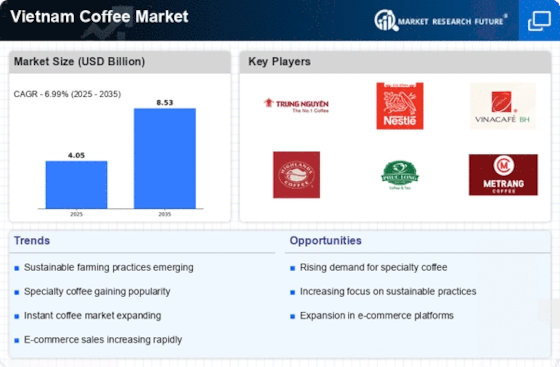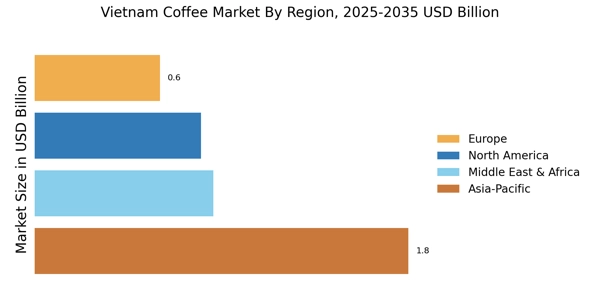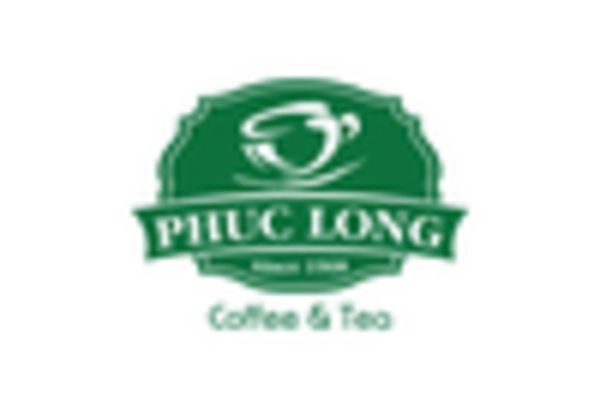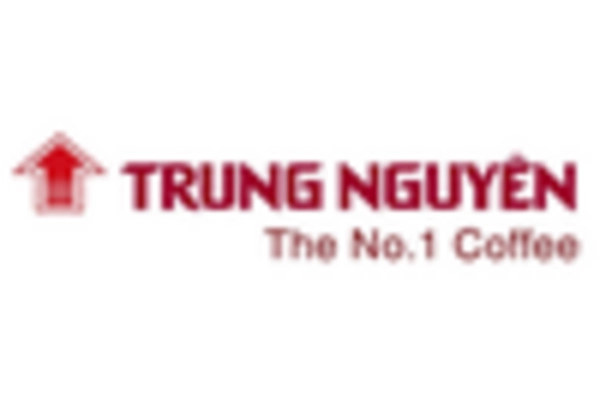Emergence of Coffee Tourism
The Vietnam coffee Market is experiencing a burgeoning trend in coffee tourism, which is attracting both domestic and international visitors. As of 2025, coffee tourism is projected to grow significantly, with regions known for coffee production, such as the Central Highlands, becoming popular destinations for coffee enthusiasts. Tourists are increasingly interested in experiencing the coffee-making process firsthand, from bean to cup, which includes farm visits, tastings, and workshops. This trend not only promotes local coffee brands but also contributes to the economic development of rural areas. The integration of cultural experiences with coffee tourism enhances the overall appeal of the Vietnam Coffee Market, as it showcases the rich heritage and diversity of Vietnamese coffee. Consequently, this emerging sector presents new opportunities for growth and innovation within the market.
Focus on Sustainable Practices
The Vietnam Coffee Market is increasingly prioritizing sustainable practices in response to both consumer demand and environmental concerns. As of 2025, a significant portion of coffee producers is expected to adopt sustainable farming methods, including organic cultivation and agroforestry systems. This shift is driven by the growing awareness of the environmental impact of traditional coffee farming, as well as the desire to meet the expectations of ethically conscious consumers. Certifications such as Fair Trade and Rainforest Alliance are becoming more prevalent, enhancing the marketability of Vietnamese coffee on the international stage. Moreover, the government is supporting initiatives aimed at promoting sustainable practices among farmers, which could lead to improved soil health and biodiversity. This focus on sustainability not only benefits the environment but also enhances the reputation of the Vietnam Coffee Market, potentially attracting a wider customer base.
Rising Demand for Coffee Consumption
The Vietnam Coffee Market is currently experiencing a notable increase in coffee consumption, driven by changing consumer preferences and a growing coffee culture. As of 2025, coffee consumption in Vietnam is projected to reach approximately 2.5 million tons, reflecting a steady annual growth rate. This surge is attributed to the rising popularity of coffee among younger demographics, who are increasingly seeking diverse coffee experiences. The proliferation of coffee shops and cafes across urban areas further fuels this demand, as consumers gravitate towards specialty and artisanal coffee offerings. Additionally, the influence of social media in promoting coffee culture has led to a heightened interest in unique brewing methods and flavors, thereby expanding the market. This trend indicates a robust potential for growth within the Vietnam Coffee Market, as businesses adapt to meet evolving consumer tastes.
Technological Advancements in Coffee Production
The Vietnam Coffee Market is witnessing a transformation due to technological advancements in coffee production and processing. Innovations such as precision agriculture, automated harvesting, and advanced processing techniques are enhancing productivity and quality. As of 2025, it is estimated that the adoption of these technologies could increase coffee yields by up to 20%, allowing farmers to meet the rising demand more efficiently. Additionally, the implementation of digital platforms for marketing and sales is enabling producers to reach a broader audience, both domestically and internationally. This technological shift not only improves the economic viability of coffee farming but also aligns with sustainability goals by reducing waste and resource consumption. Consequently, the Vietnam Coffee Market is likely to benefit from these advancements, positioning itself as a leader in modern coffee production.
Export Opportunities and Global Market Integration
The Vietnam Coffee Market is significantly bolstered by its position as one of the largest coffee exporters in the world. In 2025, Vietnam is expected to export around 1.5 million tons of coffee, primarily robusta beans, which are favored for their strong flavor and lower cost. The country's strategic location and favorable climate conditions contribute to its competitive advantage in coffee production. Furthermore, the increasing global demand for coffee, particularly in emerging markets, presents substantial export opportunities for Vietnamese coffee producers. The government has been actively promoting coffee exports through various trade agreements and initiatives aimed at enhancing quality and sustainability. This integration into the global market not only supports local farmers but also strengthens the overall economy, indicating a promising trajectory for the Vietnam Coffee Market.

















